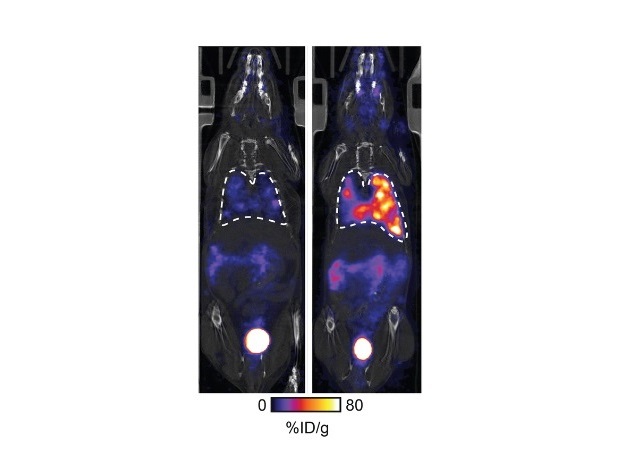New Scans Light Up Aggressive Tumors for Better Treatment
Posted on 18 Dec 2024
Non-small cell lung cancer is the most prevalent type of lung cancer. Although standard treatments such as surgery, radiotherapy, chemotherapy, and immunotherapy have advanced, survival rates have remained relatively unchanged in the last decade. Typically, patients with lung cancer begin treatment, such as chemotherapy, and then wait 12 weeks for a CT or PET scan to assess whether the tumor has shrunk, remained stable, or grown. However, this 12-week delay can often be too late to adjust the treatment plan, and end-of-life care is frequently the only remaining option. At present, there is no rapid, early method to determine if malignant tumors are resistant to treatment. Now, in a breakthrough, researchers have used a chemical compound to highlight treatment-resistant cancers in imaging scans, helping doctors target and treat the cancer more effectively. This radiotracer – an injected compound used in PET scans – could alert doctors to whether a patient's aggressive cancer will resist chemotherapy before the treatment starts. This approach would prevent unnecessary treatments and allow for alternative therapies to be considered, improving the chances of successful treatment.
Researchers from King’s College London (London, UK repurposed a radiotracer that is already used as a diagnostic tool in clinical trials in the USA and South Korea to reveal treatment-resistant tumors on PET scans. The molecule specifically targets xCT, a protein associated with tumors that are resistant to therapy. The study, published in Nature Communications, demonstrated that therapy-resistant non-small cell lung cancer tumors appeared to "light up like a Christmas tree" on PET scans after the radiotracer was injected. In the study images, PET scans of animal models showed that therapy-resistant cancer cells illuminated more brightly than tumors that responded to treatment.

Additionally, the research revealed that xCT could also be targeted with an antibody-drug conjugate, a new class of drug that targets therapy-resistant cancer cells and selectively destroys them while minimizing toxicity to healthy cells. While this research is still in its early stages, the researchers are hopeful that it could provide new treatment options for patients with aggressive and hard-to-treat cancers, such as lung, pancreatic, and breast cancers. The researchers are preparing to test this approach in humans, with a phase I clinical trial scheduled to begin in January. This trial will recruit 35 patients and use a total-body PET scanner to track xCT expression before and after treatment.
“Our study is the cumulation of five years of work. Frequently, cancer patients find out too late that the treatment they’re on does not work,” said Tim Witney, a Professor of Molecular Imaging from King’s College London, and lead researcher of the study. “The radiotracer 18F-FSPG binds to the tumor-resistant cells and lights up like a Christmas tree in imaging – clearly showing the aggressive cancer. With this technique, we can give the right treatment to the right patient, making it more cost-efficient for the NHS and providing hope for patients with aggressive tumors.”






 Guided Devices.jpg)







